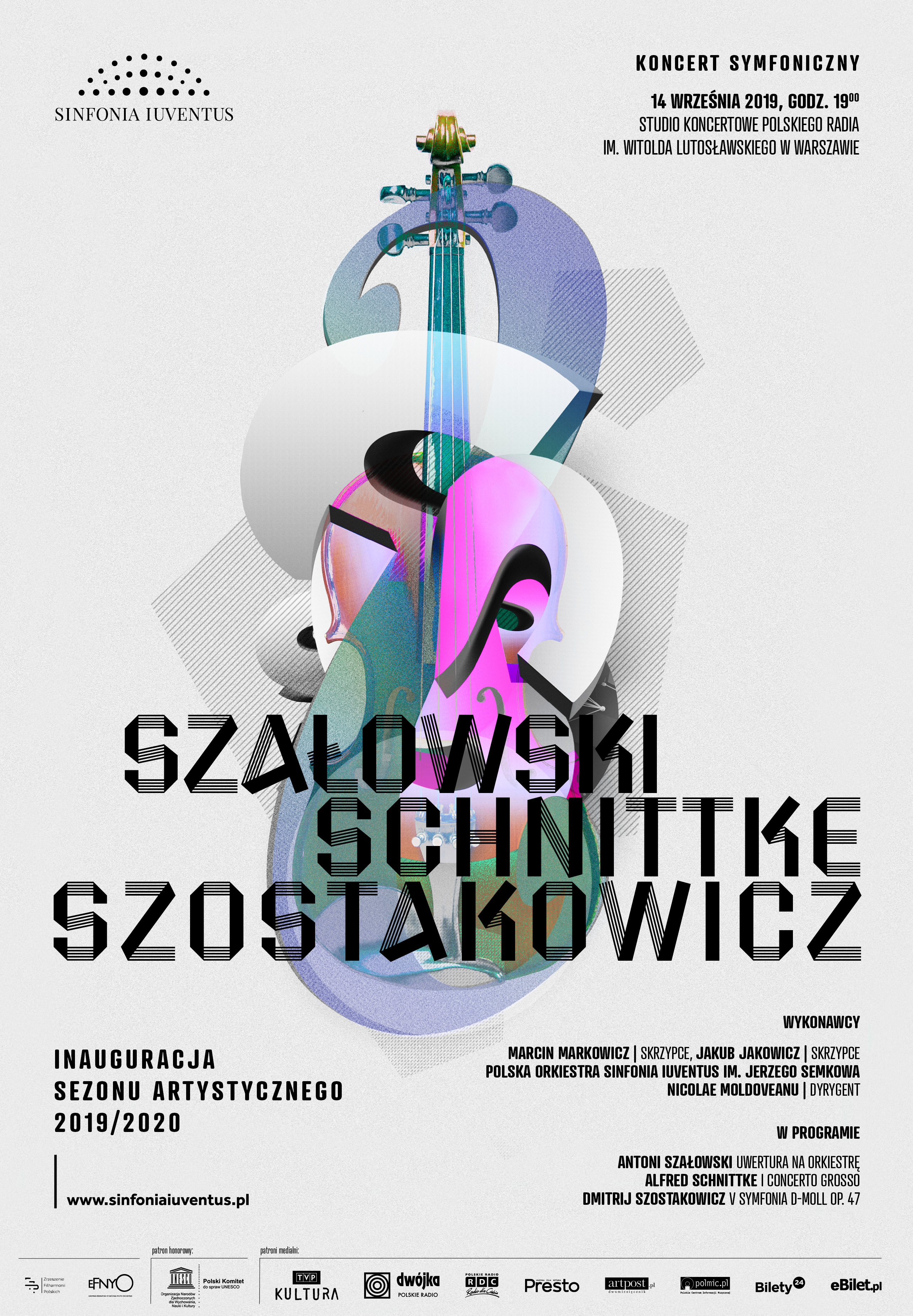Inauguration of the 2019/2020 artistic season
CONCERT UNDER HONORARY PATRONATE OF EMBASSY OF SWITZERLAND IN POLAND AND UNESCO
14 September 2019, 7 p.m.
Witold Lutosławski Concert Studio of the Polish Radio
Performers:
Marcin Markowicz – violin
Jakub Jakowicz – violin
Jerzy Semkow Polish Sinfonia Iuventus Orchestra
Nicolae Moldoveanu – conductor
Programme:
Antoni Szałowski – Overture
Alfred Schnittke – Concerto grosso No. 1
intermission
Dmitri Shostakovich – Symphony No. 5 in D minor, Op. 47
Inauguration of the new season will begin with lively, dazzling and insterstingly instrumentated Overture by Antoni Szałowski – one of the Polish students of Nadia Boulanger, who used to appreciate neoclassic style present as well in this piece.
The Leningrad audience rewarded the premiere of Symphony No. 5 by Dmitri Shostakovich, directed by Mrawiński in 1937, with 30 minutes of applause. From that moment, it became one of the composer’s favourite works, although the circumstances surrounding its composition were unfortunate. During the grimmest period of the USSR, the composer fell out of the good graces of its authorities, criticised for his supposedly “formalist” compositions, and was forced to make amends – this is how Symphony No. 5 was born. Was this piece corrupted by compromise? Despite accusations of a certain eclecticism, the scale of Shostakovich’s talent determined the lasting success of this symphony, and its neo-Mahlerian power and expression still moves listeners today. Moreover, the composer, with his traditional contrariness, “encoded” several elements that polemicized Stalinist power in the work, e.g. a self-quotation of his own song with words by Pushkin that speaks of “a barbarian painting over a work of genius with black paint”. For a chosen few, this was a clear allusion to the censorship and constant pressure to which artists were subjected. Another very personal symbol was a musical reference to the famous Habanera from the opera Carmen by Bizet, but this was more than a simple reference to the opera itself. It was a bitterly ironic reference to his beloved, Elena Konstantinowska, who rejected his advances and attached herself to the well-known Soviet filmmaker and documentalist Roman Karmen.
One generation after Shostakovich, Alfred Schnittke also struggled against the many obstacles faced by an ambitious artist in the USSR. Although he did not adopt an outright dissident stance, he was often treated with a certain amount of suspicion (for a time he was forbidden, e.g. from traveling to the West) in light of his Russian-German-Jewish origins and a musical vocabulary that was not well-suited to clerical ideas of proper “Soviet music”. Today, he is acknowledged as an important precursor and representative of post-modernism in music and his Concerto Grosso No. 1 of 1977 was one of the flagship pieces in this trend, representing a humorous (but not mocking) combination of neo- and post-Baroque, and modern elements. Composed for a duet of outstanding violinists, Gidon Kremer and Tatiana Grindenko, it brought the composer great popularity in the West. The inauguration of the new season of the Jerzy Semkow Polish Sinfonia Iuventus Orchestra will feature this piece, played by solo performers Marcin Markowicz and Jakub Jakowicz and conducted by Nicolae Moldoveanu, a valuable Romanian conductor living in Switzerland who is active as opera and philharmonic performer around the world. [Piotr Maculewicz]

